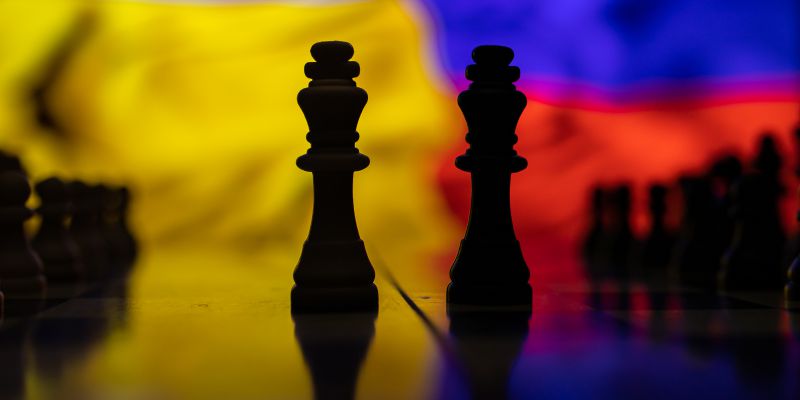
© NatStrat
India’s special and privileged strategic partner Russia has been locked in battle and confrontation with the US led West over Ukraine. The proposition could also be framed in the reverse order - that our natural partners and close friends are locked in confrontation with Russia. The verdict on which of the two propositions is more accurate depends on when we regard the confrontation to have begun. If the start date is February 24, 2022, the belligerent is Russia. If we look back, the answer is far less obvious. If we ask the two sides, their answers are poles apart. The ability to take a view on seemingly self-evident truths that is independent lies at the heart of India’s strategic autonomy. It is a path India has chosen - one that satisfies neither side.
The first few weeks of the Russian ‘Special Military Operation’ were met with expected hostility and castigation by Western governments short of direct military action, accompanied by a shrill media campaign. We were witness to information and psychological warfare in western media and related circles about the abject failure of Russian military strategy and equipment on grounds that Russian forces had not been able to capture Kyiv in one week. Demonisation of President Putin snowballed into a crescendo, as if he was the first and only leader in our generation to invade another country. The sense of moral outrage over the killing of innocent Ukrainians, for all its validity, glaringly stood out in contrast to the perfunctory coverage of thousands of civilian deaths and colossal devastation caused by military invasions in West Asia, otherwise referred to as ‘collateral damage’.
"The pursuit of our relations with Russia is sometimes attributed and to Indian sentimentality and the old school of thought."
It is lesson for us, yet again, since public memory is short, as to how misleading sensational, judgemental and instant analysis can be when it comes to matters of war and peace. The conflict is now one year old. It shows little sign of abatement or resolution, leaving aside the relative winter induced quiet. We are in a cycle of response and counter response. Russia has and will pay a heavy price in different ways. So will Europe, but the biggest price will be paid by Ukraine.
It is tempting to recall here that the Soviet Union disintegrated and fifteen states were born from it without a single shot being fired. This time the violence is disproportionate to the stakes involved. Russia has weathered the initial sanctions and other isolation better than expected. Its economy and financials are relatively stable. It has its cards to play which it is doing. The challenges to Russia are more in the medium to long term. Apart from the sanctions which will take a few years to bite, they fundamentally arise from the lack of political reform without which meaningful economic restructuring is not possible. The other serious challenge is its dwindling population. A complete decoupling from Europe is not easy and may not happen, but Russia’s dependence on China will grow. We will see greater militarisation of Russia.
The pursuit of our relations with Russia is sometimes attributed to Indian sentimentality and the old school of thought. India is called upon to explain its relationship with Russia while no such accountability is countenanced by those who, for example, have flourishing political, economic and commercial ties with China, which sits on India’s borders. The attribution to sentimentality as a causative factor for India-Russia relations is an indictment of India’s strategic thought process.
Walking away from Russia is the equivalent of handing over Russia to China. India cannot afford to follow the West in this self-defeating enterprise, the implicit assumption of which is that China is a lesser threat than Russia. This may be true sitting in Europe or the US, but not in Asia. Russia will remain relevant in India’s strategic calculus for reasons of geography, external balancing and above all to meet our gargantuan development needs. It is necessary to remind ourselves that India and Russia neither share a border nor do we have bilateral disputes.
"India will press forward on building its ties with the West with whom we share many commonalities and interests. Nations are known to maximize advantage through multiple alignments."
It would however not be a surprise if India were to recalibrate its relations with Russia in the light of developments within Russia and the world at large. Our actions during the past one year of the conflict speak for themselves. Diversification of the relationship to sectors beyond defence will be an immediate manifestation, as we have seen in the case of energy. Other steps, such as use of national currency for trade, have been initiated.
India will also prove that its external relations are not a zero-sum game. This is a model at variance with conventional western thinking, but India will press forward on building its ties with the West with whom we share many commonalities and interests. Nations are known to maximize advantage through multiple alignments. Even alliance partners are known to seek friends beyond the boundaries of their alliance. India’s position is not ideological but born out of a deep sense of who it is. Thus, if and when becoming part of an alliance is in India’s interest, we may expect it to do so. The devil is in the detail.
(Exclusive to NatStrat)